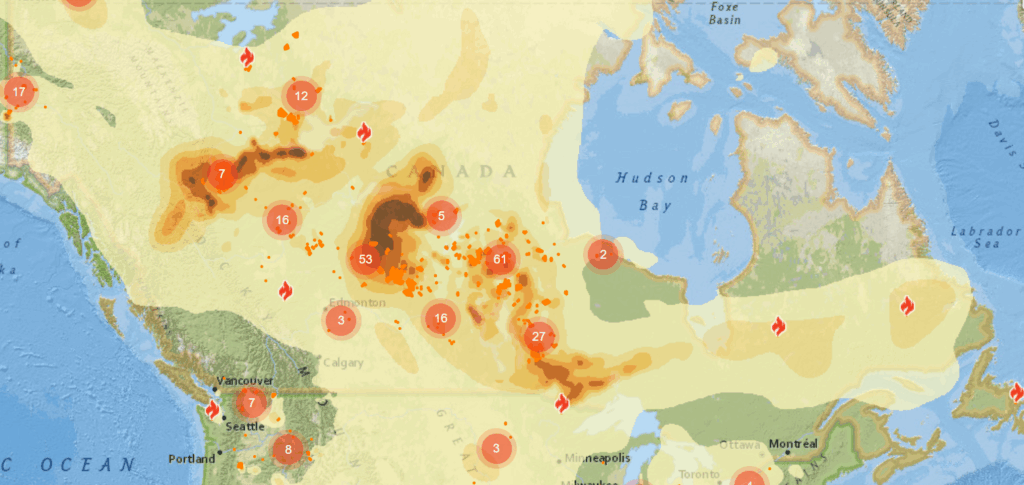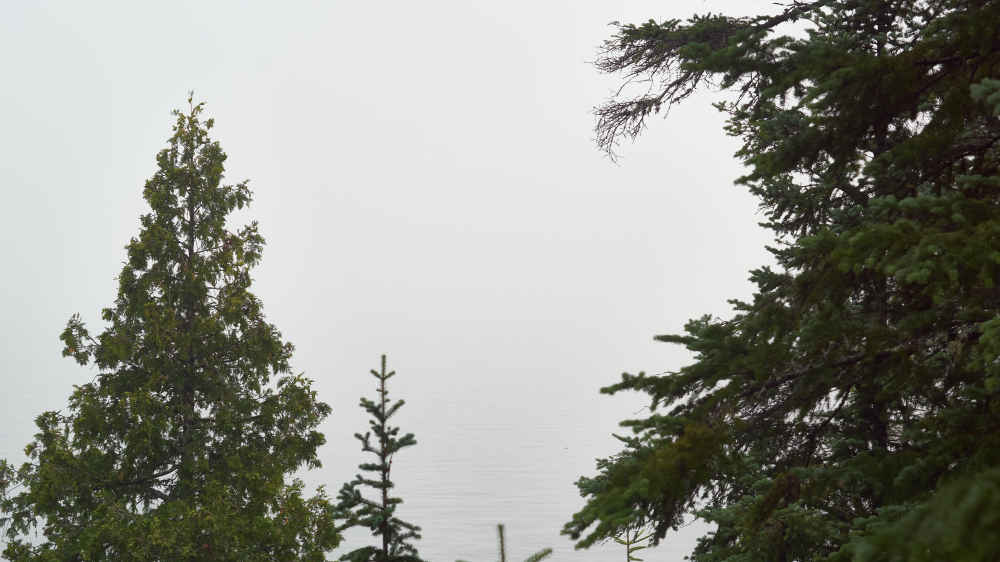I took this photo around noon today, standing on the rock in front of our place. There’s shore over there, about 4km away. Shrouded in smoke, it used to be reliably, clearly visible on a fine July day.
I’ve lived by this shore, at least part time, for over 60 years. Over the last ten years, the smoke has been an ongoing presence during summers. Sore eyes, sore throats, we have to think twice about going out for a hike or a bike ride or a sail. Those of us who are asthmatic are finding we’re using recovery and preventive medications more often.
When I was 18, a huge fire east of here in Ontario left smoke hanging in the air in July. It lasted for a week or so. The rest of the summer was clean and crisp. The smoke is coming earlier and lasting a lot longer, every year.
This year, we were evacuated for two weeks because there was a forest fire over across that shore we can’t see today. Talking to my dad, who has been a cottager at this spot since 1934 remembers only one other time when he had to evacuate. He was so young that his mom had to bundle him into the car and leave.
Our evacuation this year was the first I’ve experienced but we had another close call a few years ago when a fire broke out near Faloma. The scary thing, with these fires is that they are getting earlier in the year, too. In fact this years happened only a couple of weeks after the ice went out. Any earlier, and the water bombers could not work.
Energy Superpower?
Now Mark Carney and Wab Kinew are both talking about expediting energy projects. And both are talking about pipeline and shipping Oil and Gas far and wide.
In our rush to make a quick dollar, we are not doing a full accounting of the externalities.
How much did fighting fires in Manitoba cost this year? Manpower, fuel for aircraft and vehicles, food for firefighters, evacuation costs for lodging, meals, transportation,
How much is it costing healthcare? Increased risk of respiratory disease from living and working in conditions equal to smoking a pack of cigarettes a day. Increased risk of severe asthma and other respiratory diseases. Increased risk of mental health crises, both from being put out of your home for weeks or months, and from the existential fear of what the future looks like.
How much is it costing farmers (apparently smoke coverage isn’t good for crop growth and I wonder if animals outdoors might develop smoke inhalation problems too)? How much is it costing tourism activities?
Ironically, perhaps, these costs all make the GDP go UP – because GDP just measures the movement of money without any qualitative analysis of what that money is used for. So if healthcare costs skyrocket due to respiratory diseases and cancer, GDP goes up.
Short Term Thinking
It isn’t even rational from a market perspective. China is probably at peak emissions. They are investing heavily in renewable energy. They are investing in renewable energy in Africa. Europe is investing heavily in renewable energy. India has, finally, started investing resources in renewable energy – and considering the costs of renewables are substantially less than fossil fuels, their growth will accelerate.
Meanwhile, we are being led to believe our future lies in the oil and gas industry and spin-off industries like Carbon Capture (the most feasible method of CC is using CO2 to get more oil out of the ground and, apparently, causing methane emissions to spike).
But floods and droughts and fires and rising sea levels around the world are going to push more and more countries to reduce emissions. Renewable tech will continue to improve and price/kwh drop. Which means the world will be reducing the amount of O&G we use. Which means the price goes down – not quickly, but inevitably.
Which means Alberta’s very expensive bitumen becomes unprofitable.
What ARE They Even Thinking?
I have to admit I am totally befuddled at how Wab Kinew, having overseen Manitoba’s fire season, which has been ongoing since late April, can even think about expanding fossil fuel production and distribution. It is literally killing people.
Hasn’t he even looked at Firesmoke.ca? This is a screen capture from today, showing the country covered in smoke, with high intensity patches all across Western Canada. Apparently, Canada’s wildfire smoke may reach the UK this week (at least they aren’t as likely to publish ridiculous letters demanding we stop the smoke, like some Republican Representatives).

Long Term Thinking for Canada
While I was taking this photo, I heard our neighbour’s young child playing outside. In the smoke.
What does the world look like for him when he’s my age, sometime in the 2050s?
I’m down with being an Energy Superpower but not one that is addicted to a product that is both reaching end-of-life and is clearly destroying our health and environment. We must get better at thinking outside the fossil fuel box that enriches corporations who Do Not Care about the future beyond their next quarterly report.
It isn’t like people haven’t already worked out how to approach this. Can we please stop mindlessly following US “Drill, Baby, Drill” policy and figure how to work with Europe, China, India, and other countries who recognize this existential problem, and start building for the future instead of building for the past?
Again, I highly recommend A Good War by Seth Klein as a roadmap to where we need to be. Right. Now.


Hi Chris,
I absolutely agree. Our political cycles are so short and so terribly short-sighted. Imagine government policy tested by seven generation thinking? Something that struck me in Jody Wilson-Rabould’s Indian in the Cabinet was how rapidly the Trudeau administration pivoted away from keeping promises to winning the next election. It seems that a year or so into her mandate, her priority became all about messaging, not doing.
The Climate Crisis and Electoral Reform are core themes for me. Ultimately, if we don’t deal with the climate crisis, nothing else really matters.
To effect the change I believe you seek, we need to alter our election cycles or political MO. We do NOT think seven generations ahead and our leaders epitomize opportunism. My province is hell bent on cashing in on our carbon bomb. I cringe to think what will be traded off to so do.
Live simply, that others may simply live.